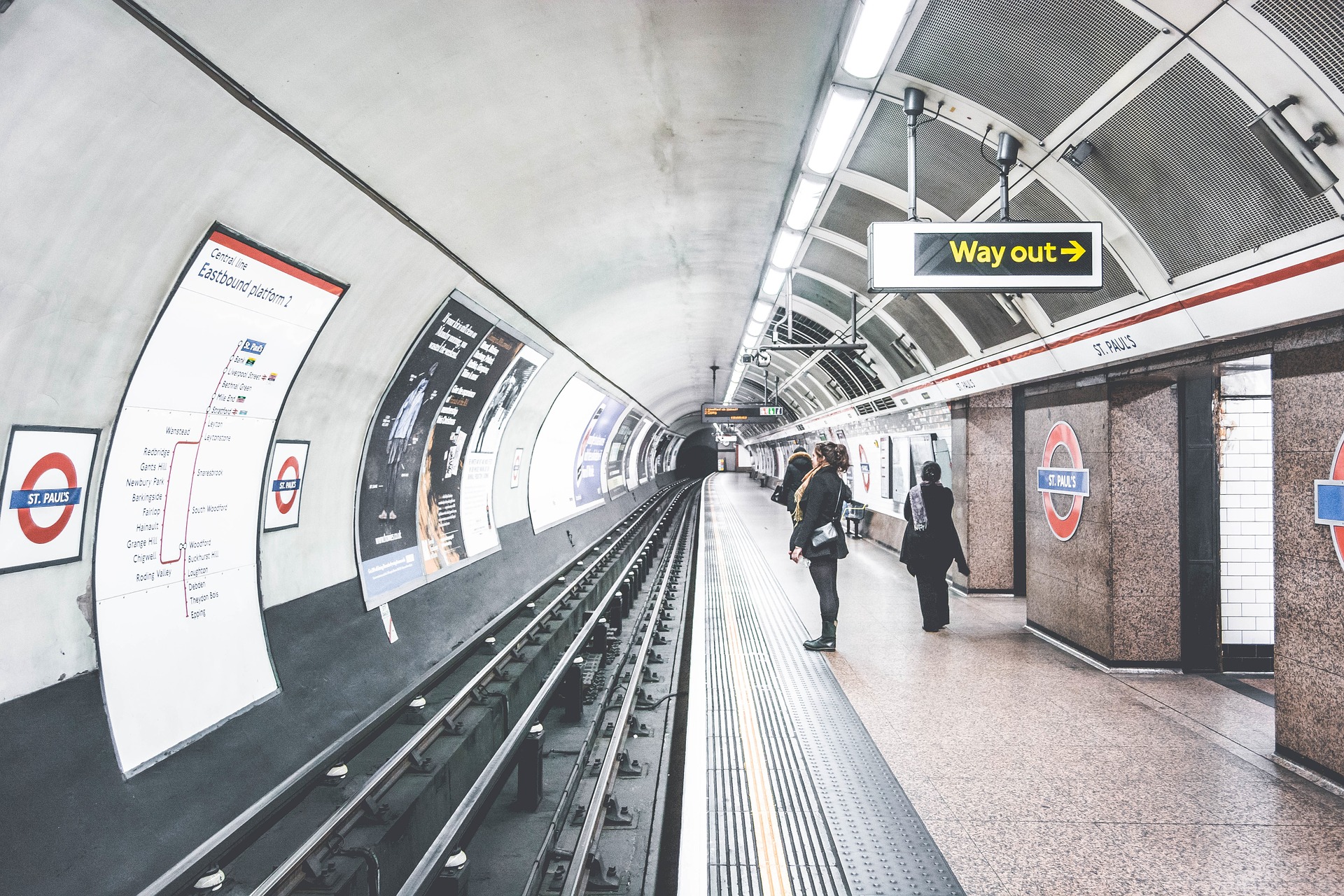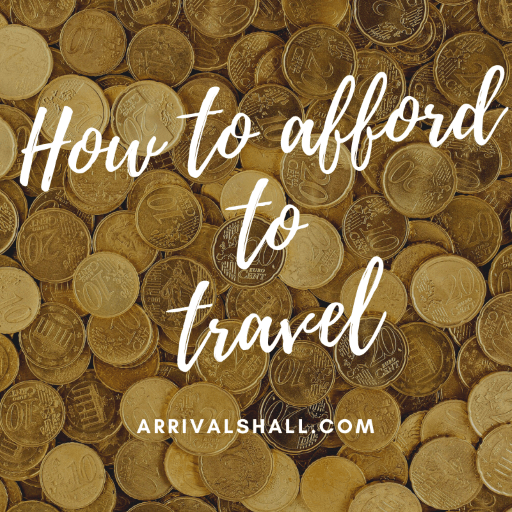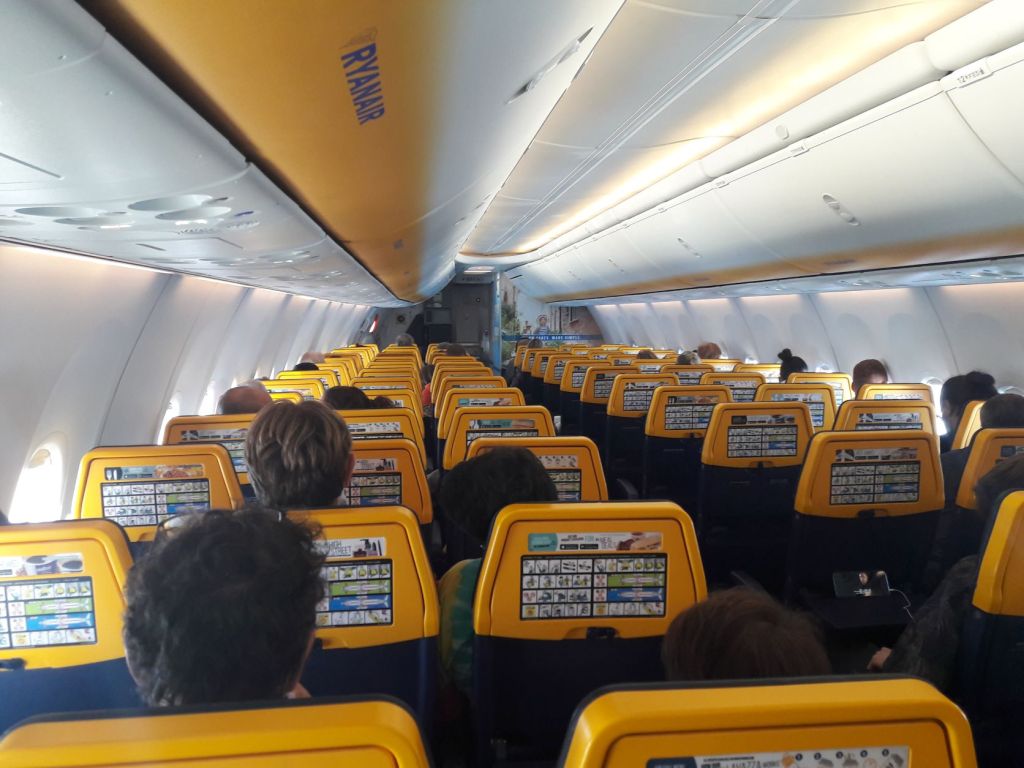This post contains affiliate links. Please see my disclosure about affiliate links here.
I often get asked how I can afford to travel. Truth is, unless you have rich parents, married well, have a well-paid job or have won the lottery, travel requires strategy and planning. In this post I’ll give you tips and advice on how to afford to travel, drawing on my own experience plus the feedback of other travellers.
TRANSPORT
- Travel off-peak: Without a doubt, the best way of travelling on a budget, particularly when looking at flights. For example, July and August are peak season months in the northern hemisphere with May/June and September/October considered the shoulder season. All school holidays are considered peak season. You should see savings of up to 50% on flights if you travel to or within Europe during the shoulder season months. Bear in mind that Bank Holidays, festivals and/or sporting events at any time of the year will lead to peak season prices.
- Book well in advance: This doesn’t always apply for budget airlines but is the norm for flag carriers such as BA, Lufthansa, Turkish Airlines, to name but a few. Six months is my definition of well in advance. Significant savings can be got for booking train tickets in advance although you may be restricted to travelling on a specific train.
- Hand luggage only: As a regular Ryanair user I’m used to packing light and can garner significant savings just by carrying hand luggage only, a €30 return trip from Kerry (Ireland) to Frankfurt Hahn (Germany) being an example. For tips on how to pack more efficiently, check out my Packing for International Travel Guide.
- Research using Skyscanner: One of my favourite travel websites and my second port of call when researching a trip. Skyscanner is a travel metasearch engine that allows travellers to compare airline prices for a journey. If you’re wondering what website is my first port of call when travel planning, readers of my Pre-Travel Checklist post will know that my government’s travel advice website takes that accolade.
- Use budget airlines: Do we have to? Yes, if you want a bargain point-to-point flight. Ryanair, Easyjet, Norwegian and Wizz Air are the best known in Europe and having flown with all four I can say that all have excellent safety records and are, by the most part, reliable. As long as you read and abide by the terms and conditions plus shift your expectations then budget airlines are a good option.
- Mix and match airlines: This is another area where budget airlines have the edge over flag carriers and works particularly well for travel to large cities with multiple airports (e.g. London). Quite often my outbound flight to London is with Aer Lingus and my inbound with Ryanair, and vice versa. One-way tickets with flag carriers can often be only marginally less expensive than their return price so one is left with no option but to book a potentially inflexible return.
- Using the same airline can give you a good deal: In a complete contradiction to the previous point, using the same airline for multiple journeys can be much more cost-effective, reliable and convenient particularly when transiting through a country where you need a visa to enter or where the onward flight has a short connection time.
- Collect airline miles/points: Sign up for airlines’ frequent flyer schemes to collect points for free flights and other benefits. Some airlines can transfer points between each other if they are members of the same aviation alliance.
- Use public transport: Very rarely do I get taxis at my destination so rely mostly on inexpensive and environmentally-friendly public transport. Yes, this option requires prior research and perhaps the printing of a colour map of the destination’s public transport system. But it’s a great way of travelling on a budget and off-setting aviation carbon emissions.

- Use a free bike scheme: Many cities have free bicycle schemes and, like public transport, this is an excellent way of travelling a destination at a low cost to your pocket and the environment. I’ve used the free bike schemes in Paris and Tel Aviv.
ACCOMMODATION
- Travel off-peak: One again, this is a no-brainer with significant savings to be had in shoulder and low-peak months. Accommodation is particularly affected by Bank Holidays, festivals and/or sporting events. For example, an acquaintance tells me that one specific Dublin hotel normally charges €150 per room per night but on All-Ireland Final weekend it increases to €400, demonstrating the literal price my county has to pay for its success in football!
- Book well in advance: Not only will you get accommodation within your price range but you will have immense choice to choose from.
- For business cities go on the weekend: Frankfurt is the classic example where I can get a room for €49 at the weekend but the same room increases to €77 from Monday to Thursday.
- Location, Location, Location: Don’t stay right in the heart of the city or near a major monument. Staying on the outskirts near a good transport link can mean saving lots, even during high season.
- Use a travel metasearch website: My website of choice for hotel accommodation is booking.com not just for the savings but for the wide range of preference filters available on the site.
- Use homestays and the sharing economy: Airbnb is probably the best known example of such but there are sites available for house swaps and house sitting, the latter usually involving caring for a pet. Wwoof involves free food and accommodation in return for voluntary work on an organic farm whilst Couchsurfing involves free accommodation in return for whatever the host specifies.
- Use hostels: Some people swear by hostels but sadly I only end up swearing at the thought of not getting a good night’s sleep.
- Do you really need to stay in a 5-star hotel: This is the needs versus desires point. What exactly are your priorities for your trip? Will staying in a lesser-star suffice? Cut your cloth to suit your measure.
DINING
- Early bird menus: In some countries, choosing to eat a set menu at an earlier time of the evening on specific days is a great way of dining on a budget along with feasting like royalty.
- Picnic lunches: Pick up a takeaway lunch from a supermarket/street stall or make your own when heading out and about. Book + baguette + Mediterranean beach is my idea of heaven, budget or otherwise.
- Location, Location, Location: Avoid dining near major monuments. Major savings can be made from dining at restaurants and cafes on nearby side-streets. Follow the locals for the best prices and the best food.
- Be careful of the little things with big prices: Items with high levels of saturated fats and refined carbohydrates are bad for our waistline but equally so for our wallet with ice-cream being the prime culprit. Healthier items such as coffee and water often have marked-up prices as I discuss in this Radio Kerry podcast.
- Learn key menu phrases in the destination language: Or simply ask the waiting staff if tax/service is included.
- Go self-catering and cook meals in: A great option if staying for more than a few days but in some countries it’s as cheap to eat out as it is to cook in.
GENERAL
- Travel independently: By booking flights and accommodation separately you nearly always save money over the package version and is one of the main ways of affording to travel. On the other hand, a package booked through a travel agent will usually include transfers etc so weigh up what is more important – your budget versus convenience. Also, travel agents often offer a facility to pay in installments whereas flights booked independently are paid upfront.
- Book tickets for major sites online in advance: Not only will you save money but will jump the lengthy queue.
- Avail of free days/evenings: Some sites have free days or evenings but these are generally not bookable in advance so can have lengthy queues with Madrid’s Prado springing to mind.
- Avoid resorts: Resorts are convenient and stress-free options when accessing another country but prices tend to be much more expensive than non-resort areas. Significant savings can be made by going off-piste although this option will probably require language and navigational skills.
- Mix and match trips: Follow an expensive trip with a cheap trip. My trip to New York was followed a few months later by a holiday to the inexpensive destinations of Serbia and Montenegro.
- Free walking tours: A great way of learning about your destination and meeting other travellers, free walking tours work on a tip system. Check out my Belgrade and St. Petersburg posts for some recommendations.
- Watch currency fluctuations: I use the xe.com website to chart a currency’s progress. Make sure you know the exchange rate between your home currency and the currency of your destination so you can mentally calculate the prices into your own currency.
- Political concerns: This works both ways. Political ructions and sanctions can cause prices to drop or increase. For example, UN sanctions against Russia regarding the annexing of Crimea caused the ruble to drop 50% in value against the Euro. Political instability can also cause shortages which inflate prices.
- EU residents should get the EHIC: The EHIC is the European Health Insurance Card and is freely available to EU residents. The Card entitles the holder to healthcare in the public system of any EU/EEA member state or Switzerland should the holder become ill or injured while on a temporary stay in that country. However, there have been concerns regarding healthcare access through the EHIC. I fell ill in Estonia and only required a General Practitioner visit but was told that General Practitioners in Estonia don’t treat non-resident EHIC holders. In Ireland, General Practitioners treat all EHIC holders.
- Get travel insurance: Essential to cover yourself against costly travel risks. Check with your house or car insurance company if they offer travel policies as they may give you a discount as an existing customer. Note that pre-existing medical conditions are not covered on most travel insurance policies unless you pay an extra fee.
LIFESTYLE
- Live frugally: Another key way of how to afford to travel. In other words, cut costs on day-to-day spending where possible. Look at your spending in terms of needs and wants. Yes, you need a phone but do you really need the new €700 model when the €70 model will adequately cover your needs? Track your spending and see where you can cut back. Claim tax refunds where possible. Bring a home-made lunch to work instead of eating out. Matthew Karsten of Expert Vagabond has put together a post on how to save money for travel, predominantly by living a no-frills life.
- Prioritise: How important is travel to you? Are you prepared to sacrifice certain things in order to fund travel? For my earlier-mentioned acquaintance following the Kerry football team is his raison d’être and will more than happily spend as much money pursuing this passion as I do on international travel.
- Don’t do illegal drugs: Along with illegal drugs being potentially harmful to your body and the risk of developing an expensive addiction, your hard-earned money is buying flash cars and mansions for criminals. Do you really want to waste your money this way?
- Watch your alcohol intake: If you’re going to drink beyond your pocket and body’s means then your next destination is a rehab clinic. One can forgive the folly of youth for the occasional binge as a rite of passage but doing it as a continuous lifestyle choice? The point I’m trying to make? Save bucket-loads of money (and your liver) by drinking responsibly. Interestingly, the people who question the financing of my travels all have a dysfunctional relationship with alcohol.

- Find an alternative revenue stream: Getting a second job is easier said than done, especially in an economic recession, but look at other opportunities. Have a musical talent? Busk or offer your services to a band or a pub. Milk cows for a holidaying or ill farmer. Sell your arts and crafts online. Rent out a room to a long-term tenant, the earnings of which are often tax-free (In Ireland, tax-free for earnings up to €14,000). These are just some of the examples of what can be done to earn extra money. What you do is entirely up you.
So there you have it. I hope the tips and advice here will help you to afford to travel. Much will depend on your existing resources and I can appreciate that that may already be challenging. And if you live in a country where the goalposts are constantly being moved by inflation, for example, then you have an additional test.
Travelling on a budget requires effort and work. Budgeting isn’t easy and requires time plus plenty of decision-making. Expectations may need to be shifted and plans scaled back. But if travelling is your dream then, as Oprah Winfrey once said, the biggest adventure you can take is to live the life of your dreams.
Bon voyage.
More advice on other travel topics is available on my General Travel Advice page.


Very helpful post – full of details – thanks!
LikeLiked by 1 person
You’re welcome. Glad you liked it.
LikeLike
Great list of tips. It’s true and strategy and planning are needed to travel on a budget. I’m really annoyed about Ryanair’s new luggage charges! Have you heard that all cabin bags are now chargeable, whether they fit in the overhead lockers or not!! Won’t be flying Ryanair anymore!
LikeLiked by 1 person
Thanks. I’ll be honest and say that I’ve seen so many people abuse the Ryanair hand luggage policy that I’m not surprised they’ve clamped down.
LikeLike
I used to use Momondo a lot for searching cheap flights, because they have nice graphs on when days will be cheapest. But this feature doesn’t seem to work anymore, so I mainly use Skyscanner too. Awesome tips!
LikeLiked by 1 person
Very thorough. Informative post. Thanks.
LikeLiked by 1 person
Great tips here! Very practical advice, worth following.
LikeLike
Thanks for the feedback.
LikeLike